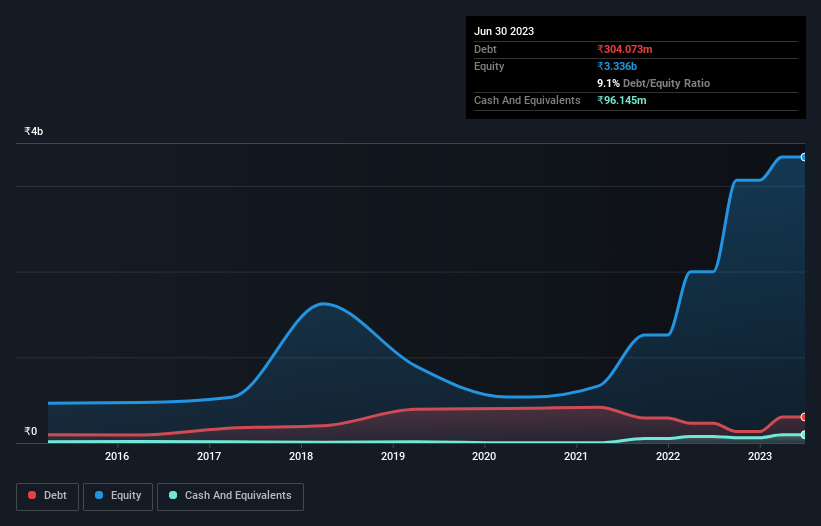- India
- /
- Trade Distributors
- /
- NSEI:VIKASLIFE
Vikas Lifecare (NSE:VIKASLIFE) Seems To Use Debt Quite Sensibly
The external fund manager backed by Berkshire Hathaway's Charlie Munger, Li Lu, makes no bones about it when he says 'The biggest investment risk is not the volatility of prices, but whether you will suffer a permanent loss of capital.' So it seems the smart money knows that debt - which is usually involved in bankruptcies - is a very important factor, when you assess how risky a company is. Importantly, Vikas Lifecare Limited (NSE:VIKASLIFE) does carry debt. But should shareholders be worried about its use of debt?
Why Does Debt Bring Risk?
Debt and other liabilities become risky for a business when it cannot easily fulfill those obligations, either with free cash flow or by raising capital at an attractive price. In the worst case scenario, a company can go bankrupt if it cannot pay its creditors. While that is not too common, we often do see indebted companies permanently diluting shareholders because lenders force them to raise capital at a distressed price. Of course, debt can be an important tool in businesses, particularly capital heavy businesses. When we examine debt levels, we first consider both cash and debt levels, together.
View our latest analysis for Vikas Lifecare
What Is Vikas Lifecare's Debt?
As you can see below, at the end of March 2023, Vikas Lifecare had ₹304.1m of debt, up from ₹230.8m a year ago. Click the image for more detail. However, it also had ₹96.1m in cash, and so its net debt is ₹207.9m.

A Look At Vikas Lifecare's Liabilities
According to the last reported balance sheet, Vikas Lifecare had liabilities of ₹1.06b due within 12 months, and liabilities of ₹148.7m due beyond 12 months. Offsetting this, it had ₹96.1m in cash and ₹1.70b in receivables that were due within 12 months. So it actually has ₹583.4m more liquid assets than total liabilities.
This surplus suggests that Vikas Lifecare has a conservative balance sheet, and could probably eliminate its debt without much difficulty.
We use two main ratios to inform us about debt levels relative to earnings. The first is net debt divided by earnings before interest, tax, depreciation, and amortization (EBITDA), while the second is how many times its earnings before interest and tax (EBIT) covers its interest expense (or its interest cover, for short). Thus we consider debt relative to earnings both with and without depreciation and amortization expenses.
Vikas Lifecare's net debt is sitting at a very reasonable 1.6 times its EBITDA, while its EBIT covered its interest expense just 4.0 times last year. While that doesn't worry us too much, it does suggest the interest payments are somewhat of a burden. Notably, Vikas Lifecare's EBIT launched higher than Elon Musk, gaining a whopping 600% on last year. The balance sheet is clearly the area to focus on when you are analysing debt. But you can't view debt in total isolation; since Vikas Lifecare will need earnings to service that debt. So when considering debt, it's definitely worth looking at the earnings trend. Click here for an interactive snapshot.
Finally, a company can only pay off debt with cold hard cash, not accounting profits. So it's worth checking how much of that EBIT is backed by free cash flow. During the last three years, Vikas Lifecare burned a lot of cash. While that may be a result of expenditure for growth, it does make the debt far more risky.
Our View
Based on what we've seen Vikas Lifecare is not finding it easy, given its conversion of EBIT to free cash flow, but the other factors we considered give us cause to be optimistic. In particular, we are dazzled with its EBIT growth rate. Considering this range of data points, we think Vikas Lifecare is in a good position to manage its debt levels. But a word of caution: we think debt levels are high enough to justify ongoing monitoring. The balance sheet is clearly the area to focus on when you are analysing debt. However, not all investment risk resides within the balance sheet - far from it. For example, we've discovered 2 warning signs for Vikas Lifecare (1 is a bit unpleasant!) that you should be aware of before investing here.
If, after all that, you're more interested in a fast growing company with a rock-solid balance sheet, then check out our list of net cash growth stocks without delay.
New: Manage All Your Stock Portfolios in One Place
We've created the ultimate portfolio companion for stock investors, and it's free.
• Connect an unlimited number of Portfolios and see your total in one currency
• Be alerted to new Warning Signs or Risks via email or mobile
• Track the Fair Value of your stocks
Have feedback on this article? Concerned about the content? Get in touch with us directly. Alternatively, email editorial-team (at) simplywallst.com.
This article by Simply Wall St is general in nature. We provide commentary based on historical data and analyst forecasts only using an unbiased methodology and our articles are not intended to be financial advice. It does not constitute a recommendation to buy or sell any stock, and does not take account of your objectives, or your financial situation. We aim to bring you long-term focused analysis driven by fundamental data. Note that our analysis may not factor in the latest price-sensitive company announcements or qualitative material. Simply Wall St has no position in any stocks mentioned.
About NSEI:VIKASLIFE
Vikas Lifecare
Engages in the trading of polymers and chemicals, iron and steel, and plastic products in India, Mauritius, and Bangladesh.
Adequate balance sheet and slightly overvalued.
Market Insights
Community Narratives



